When it comes to cord blood preservation, the focus often shifts solely to the final stage: the freezing of the sample. But what truly makes a difference happens much earlier: the PROCESSING of the biological material (blood, cord, and placenta).
It is during this phase that the sample is processed, tested, and prepared for cryopreservation.
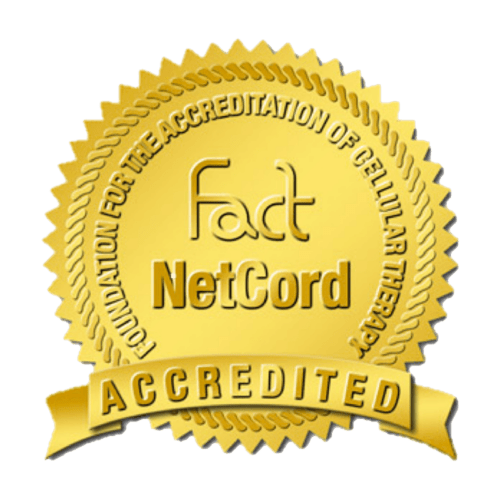
The global clinical standard specific to cord blood, with stringent requirements for collection, processing, and storage, ensuring inclusion in international transplant registries (and thus the actual usability of the sample in a transplant context)
factglobal.org, parentsguidecordblood.org
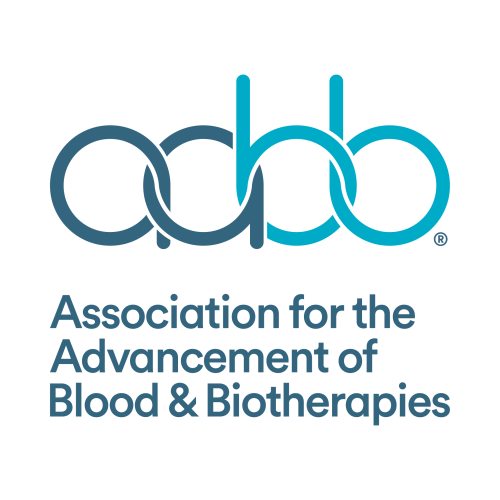
A more "generic" standard for process and traceability, useful for operational quality, but which does not ensure the same level of clinical acceptance in transplant registries: this means that a unit certified only by AABB may not be usable when it is truly needed
cord.memberclicks.net, parentsguidecordblood.org
PROCESSING is an active and critical phase, requiring controlled environments, highly qualified personnel, and strict protocols.
CRYOPRESERVATION, on the other hand, is a passive phase: it only works if the processing has been done correctly.
Swiss Stem Cells Biotech (SSCB) is the only private biobank in Switzerland that manages the entire process – from processing to cryopreservation – in its own laboratories in Switzerland, accredited by FACT–NetCord for cord blood, and GMP certified for cord tissue and placenta.
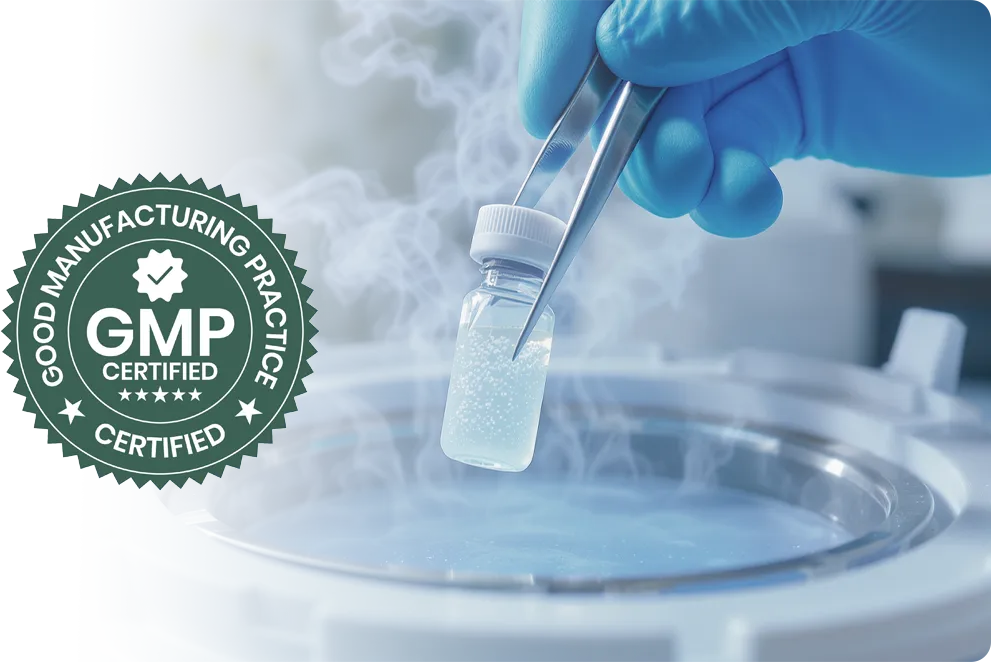

Why Choose Swiss Stem Cells Biotech?
Many companies present themselves as “Swiss” but do not have their own laboratories in the country. For this reason:
We have been active for over 20 years and we offer you:
I am just a local distributor of foreign groups.
Regarding the processing phases, unlike its main competitors, SSCB is regularly inspected by Swissmedic and every three years by independent auditors from FACT-NETCORD, ensuring absolute quality for all our clients.
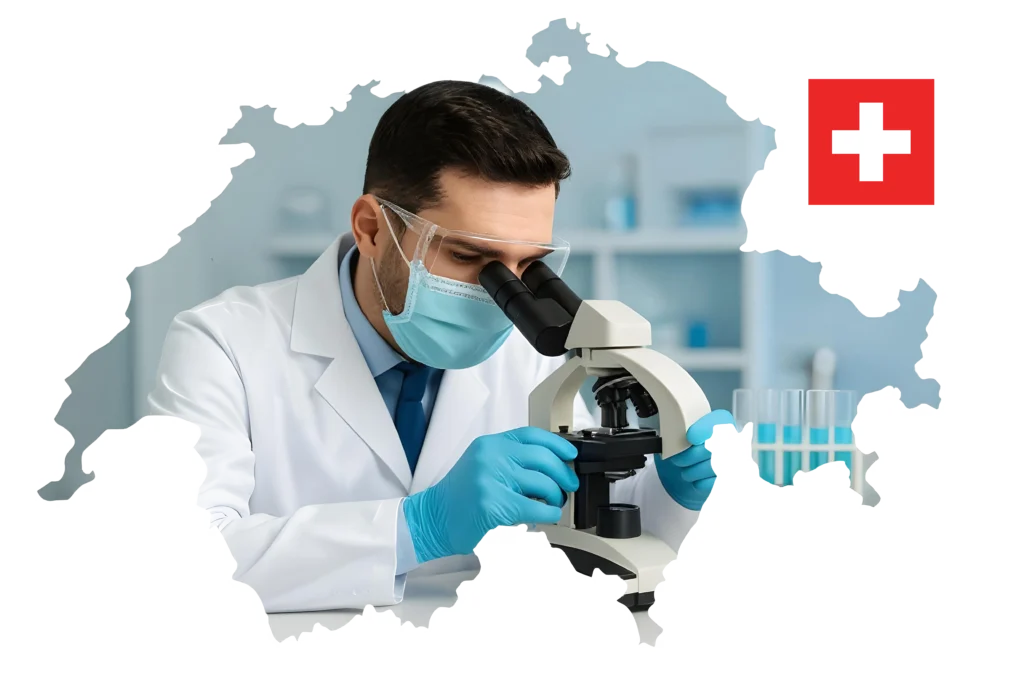
SSCB is the only private biobank in Switzerland authorized to offer the hybrid banking model, thanks to its presence across the country and its certifications.
This is made possible by a pilot project approved by the Federal Office of Public Health (FOPH) and implemented in partnership with:
– Swiss Blood Stem Cells of Transfusion (CRS) Switzerland
– Bern University Hospital
– Canton Hospital Authority Ticino EOC
If parents choose to donate, the stem cells will no longer be available to the family. In case of need, they must consult the public registry to check the availability of compatible cells.
A choice that protects the family: the stored cells are reserved exclusively for the child or their relatives, ensuring maximum safety for their health. While the service requires a financial contribution, it offers a valuable opportunity for the family's future.
The most complete option: stem cells are stored for family use but can be donated upon request. In the event of a transplant donation, the storage costs are reimbursed. A choice that combines family protection with solidarity, with the final decision always in the hands of the family.
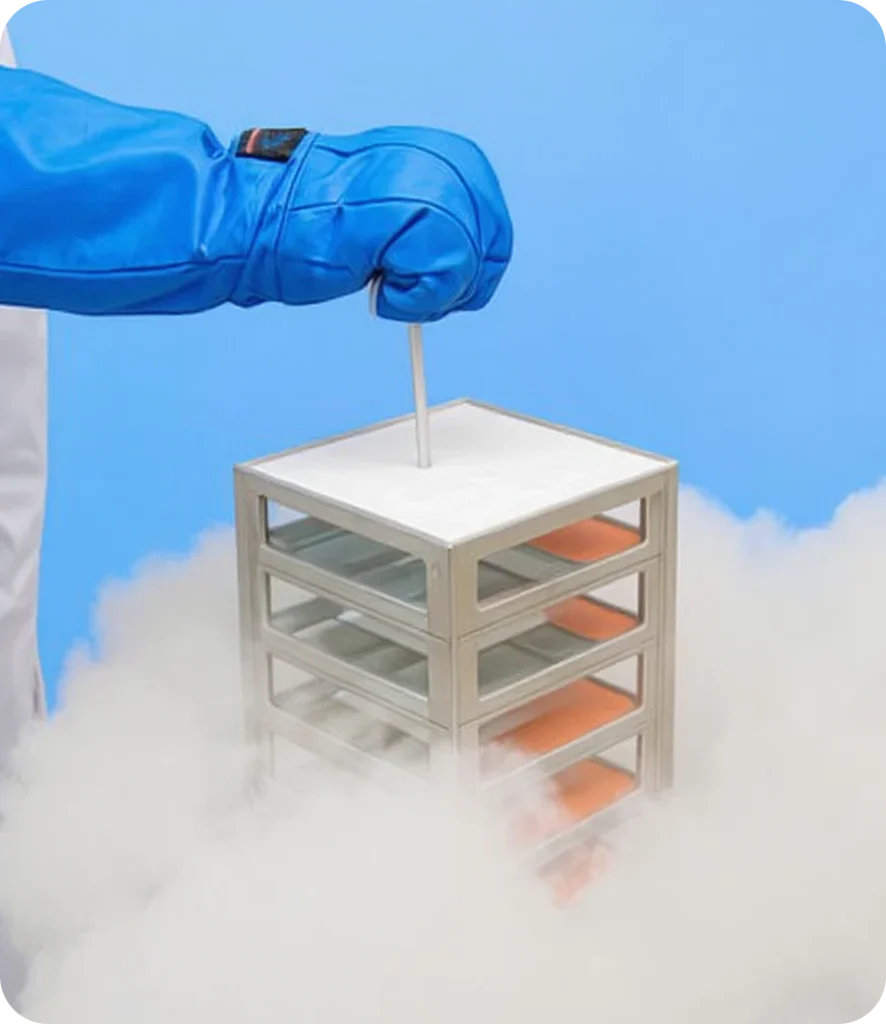
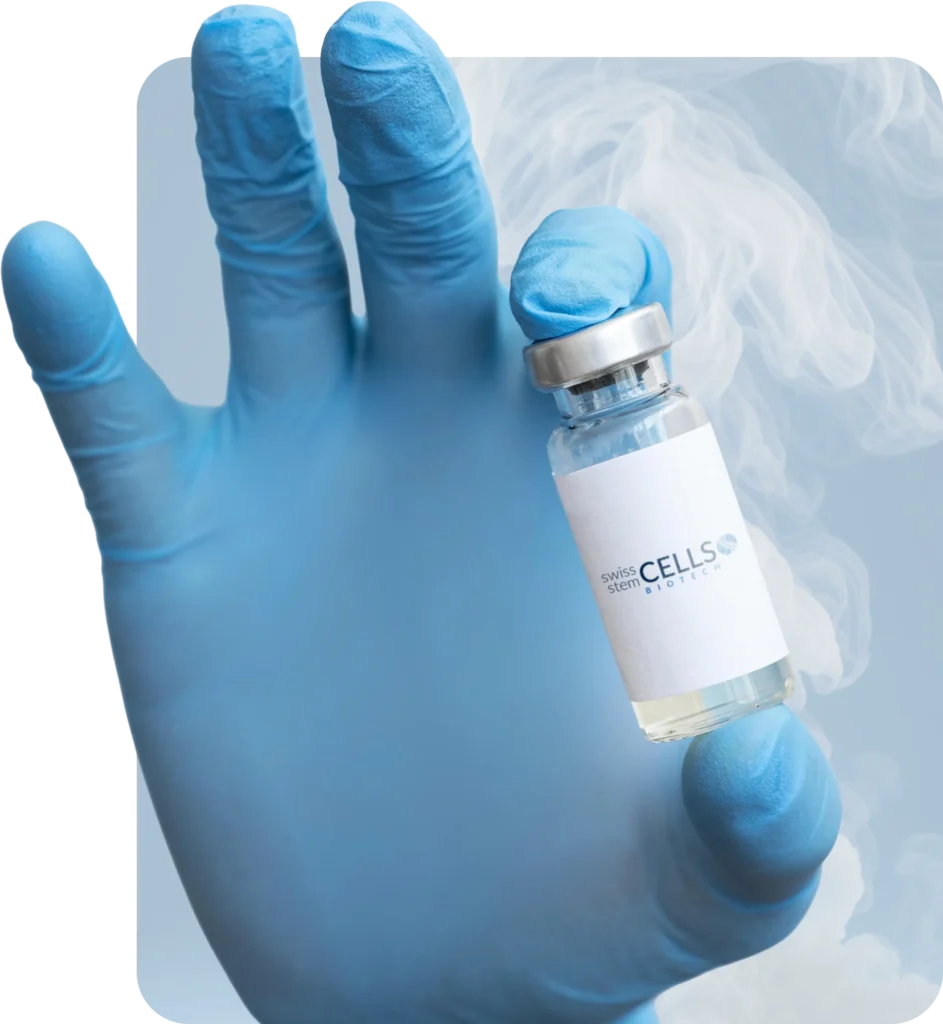
specific requirements are needed (and we have them)
According to Swiss jurisprudence and the Federal Office of Public Health (FOPH), the processing of cord tissue is subject to specific criteria:
SSCB is fully compliant with all these requirements. In our laboratories in Switzerland, we process and cryopreserve cord tissue according to the required standards, without any foreign outsourcing.
Appearance | SSCB – Swiss Stem Cells Biotech | Other operators present in Switzerland (e.g. Famicord Suisse SA and Future Health) |
|---|---|---|
Processing | Takes place in Switzerland, in the GMP-certified SSCB-owned laboratories. | Takes place abroad, at laboratories of the group or third parties, not located in Switzerland. |
Final cryopreservation | In Switzerland, immediately after processing | In foreign countries, or in Switzerland after bulk reimportation |
Temporary initial cryopreservation | Not necessary as at the end of the processing phase the sample is immediately cryopreserved in the same facility. | Abroad |
Processing laboratories | Owned by SSCB, located in Switzerland, accredited by FACT–NetCord* and authorized by Swissmedic. | Abroad; no laboratory for production and processing in Switzerland, which takes place abroad, but only facilities for final cryopreservation (temporary cryopreservation in processing countries). |
Declared standards | FACT–NetCord, GMP, GDP, Swissmedic compliance (SSCB undergoes periodic inspections)
FACT-NetCord – The global clinical standard specific to cord blood, with stringent requirements for collection, processing, and storage, ensuring inclusion in international transplant registries (and thus the actual usability of the sample in a transplant context) standards_and_accreditation.pdf | Often, generic certifications not specific to cord blood (for example, AABB*) are sometimes not specified in contracts without clarifications regarding the entity to which the standard would have been attributed. GDP (Swissmedic) for export, re-importation to Switzerland
AABB – A more “generic” standard of process and traceability, useful for operational quality, but which does not ensure the same level of clinical acceptance in transplant registries: this means that a unit certified only AABB may not be usable when it is truly needed standards_and_accreditation.pdf |
Sample traceability | Total and direct, From the delivery room the biological material arrives without intermediate steps directly to our laboratories where it will be processed and cryopreserved. | Several steps – from the delivery room, the biological material is transported abroad for processing and managed according to the applicable local laws. Only afterwards is it transported in bulk to Switzerland (if applicable). |
Transport of biological material (blood, cord tissue, placenta) | Dedicated to each individual customer and within Switzerland: from the delivery room directly to the SSCB laboratories. | Biological material is transported from the delivery room abroad for processing and initial cryopreservation. Only later (if applicable) is it imported in bulk to Switzerland for final storage, with transport terms not always clearly defined in the contracts. |
Contractual aspects | Clear contracts: indicate where processing and cryopreservation take place, with reference to standards and laboratories. | Contracts often only mention cryopreservation in Switzerland, without clearly specifying the location of processing, which actually takes place abroad. In some cases, the information is completely omitted, while in others it is expressed in a vague manner, making it difficult to understand exactly where the processing occurs. Processing, according to AABB standards, constitutes a critical and active phase; therefore, one cannot rely solely on the mention of cryopreservation, which instead represents a passive process of simple storage. |
Processing of personal data | Exclusive treatment in Switzerland, in accordance with the Federal Act on Data Protection (FADP) | Treatment in Switzerland and abroad |
Hybrid banking model | Already available at Inselspital and EOC, only with SSCB upon approval from the Federal Office of Public Health of the Swiss Confederation (UFSP). The goal of the project is to extend it throughout the entire Swiss territory. | Not available |
Experience and history | Over 20 years of operation in Switzerland, thousands of families served | Often recent local operators or branches of foreign groups that perform the functions of exporters, reimporters, and storage (without laboratories and permits for processing in Switzerland) |
Disposal of excess biological material | Management entirely in Switzerland, processes tracked and verified by Swissmedic | Foreign local regulations and procedures, often not defined in contracts. |
Takes place in Switzerland, in the owned SSCB laboratories, certified GMP
Takes place abroad, at group or third-party laboratories, not located in Switzerland
In Switzerland, immediately after processing
In foreign countries, or in Switzerland after bulk re-importation
Not necessary as the sample is immediately cryopreserved in the same facility at the end of the processing phase
Abroad
Owned by SSCB, located in Switzerland, accredited FACT–NetCord* and authorized by Swissmedic
Abroad; no laboratory for production and processing in Switzerland, which takes place abroad, but only facilities for final cryopreservation (temporary cryopreservation at processing countries)
FACT–NetCord, GMP, GDP, compliance with Swissmedic (SSCB receives periodic inspections)
FACT-NetCord – The global clinical standard specific to cord blood, with stringent requirements for collection, processing, and storage, ensuring inclusion in international transplant registries (and thus the actual usability of the sample in a transplant context) standards_and_accreditation.pdf
Often generic certifications not specific to cord blood (e.g. AABB*) in some cases unspecified in contracts without clarifications regarding the entity to which the standard would have been attributed. GDP (Swissmedic) for export, re-importation to Switzerland
AABB – A more “generic” standard of process and traceability, useful for operational quality, but does not ensure the same level of clinical acceptance in transplant registries: this means that a unit certified only AABB may not be usable when it is really needed standards_and_accreditation.pdf
Total and direct, From the delivery room the biological material arrives without intermediate steps directly to our laboratories where it will be processed and cryopreserved
Multiple steps – from the delivery room the biological material is transported abroad for processing and managed according to applicable local laws. Only later, it is transported in bulk to Switzerland (if applicable).
Dedicated to each individual client and internal to Switzerland: from the delivery room directly to the SSCB laboratories
The biological material is transported from the delivery room abroad for processing and initial cryopreservation. Only later (if applicable) is it imported in bulk to Switzerland for final storage, with transport terms not always clearly defined in contracts.
Clear contracts: indicate where processing and cryopreservation take place, with reference to standards and laboratories
Often contracts only mention cryopreservation in Switzerland, without clearly specifying the location of processing, which actually takes place abroad. In some cases, the information is completely omitted, in others it is expressed in a way that makes it difficult to understand exactly where processing occurs. Processing, even according to AABB standards, constitutes a critical and active phase; therefore, one cannot rely solely on the mention of cryopreservation, which instead represents a passive process of simple storage.
Exclusive processing in Switzerland, in compliance with the Federal Data Protection Act (LPD)
Processing in Switzerland and abroad
Already available at Inselspital and EOC, only with SSCB upon approval from the Federal Office of Public Health of the Swiss Confederation (UFSP). The goal of the project is to extend it throughout Switzerland.
Not available
Over 20 years of activity in Switzerland, thousands of families served
Often recent local operators or branches of foreign groups that act as exporters, re-importers, and storage (without laboratories and authorizations for processing in Switzerland)
Management entirely in Switzerland, processes traced and verified by Swissmedic
Foreign local regulations and procedures, often not defined in contracts
The table summarizes some relevant comparison criteria between the standards. It does not claim to be exhaustive or fully applicable to every operator present in Switzerland, but it provides a clear overview of the points that, according to our experience, are of greatest interest to families.
Would you like to learn more or speak with one of our consultants?


Certified Swiss Biotech company a leader in stem cell preservation.
